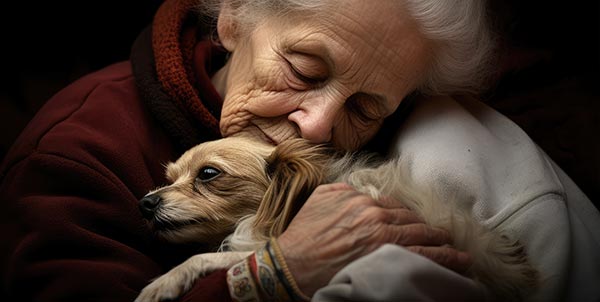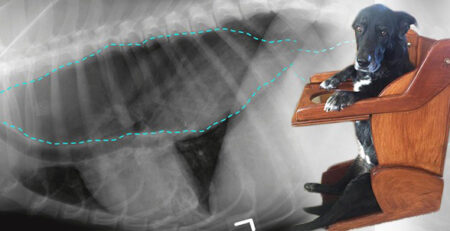Table of Contents
Does your elderly dog seem disoriented and confused, staring blankly into space, getting stuck or not recognizing you?
The elderly four-legged could be suffering from Cognitive Dysfunction Syndrome (CDS) i.e., the canine equivalent of Alzheimer’s.
Here is how you can manage and help him at this particular time in his life when, vulnerable and helpless more than ever, he needs you most.
The symptoms of cognitive dysfunction syndrome may initially be interpreted as those typical of senile age in dogs.
During the aging process, dogs (as well as humans) may suffer progressive hearing or vision loss.
All their organs are affected by age, including the brain.
So, aging naturally also implies the onset of mild signs of dementia.
But when the dog can no longer recognize known people, starts wandering aimlessly, and radically changes its personality and behaviors, it is likely to suffer from cognitive dysfunction syndrome (CDS).
CPS, in fact, is characterized by a progressive and permanent decline in the dog’s cognitive functions.
What is meant by cognitive functions of the dog?
The term “cognitive functions” includes:
- attention span
- perception and awareness
- memory
- the ability to learn
What are the first clear signs of cognitive dysfunction syndrome in dogs?
- Changes in sleep rhythm
Dogs with dementia sleep more often during the day and have phases of wakefulness and long-term insomnia during the night.
They also suffer from increased restlessness during sleep and tend to pant or wake up startled.
- Disorientation
The disorientation of dogs with dementia is also expressed in their typical fixed stare, as if they are observing something that is not there, or in standing frozen in front of or behind furniture for no apparent reason.
- Memory loss
In dogs with cognitive dysfunction syndrome you may notice a lack of response to verbal exhortations such as, “Let’s go for a walk,” “Come on,” “Bedtime.”
Basically, the dog “forgets” the association between the words you speak and the habitual behavior it has always had.
- Loss of learned behaviors
Also due to dementia, awareness of some established behaviors is lost in the dog.
An example is that of the sick dog who repeatedly urinates in the house without any signal that would in any way predict it.
- Anxiety and modification of social interactions
TDI affects the way your dog interacts with you and the home environment.
Your dog may exhibit severe anxiety when separated from you or, conversely, spend a lot of time secluded and alone.
Any behavioral variation in your senior dog, therefore, could be symptomatic of this condition.
But how is the diagnosis of cognitive dysfunction syndrome made?
Unfortunately, there is no real diagnostic test.
Your trusted veterinarian will be able to confirm the diagnosis only after ruling out all diseases with symptoms similar to WBS:
- diabetes, Cushing’s syndrome, hypothyroidism
- arthritis
- metabolic disorders
- loss of sight or hearing
- urinary tract infection
What is the origin of this syndrome?
Unfortunately, dementia is an incurable disease of the nervous system that mainly affects elderly dogs aged 11 to 15 years but can occur as early as age 7.
One thing is certain: the sooner measures to counteract it are initiated, the better we can slow the progression of the disease.
Is there a specific treatment for cognitive dysfunction syndrome?
The contrast therapy of canine DBS basically involves:
- Specific nutrition for elderly dogs
Some substances are able to actively support the nervous system of the elderly dog’s dog.
These include, for example, antioxidants, which capture free radicals and protect brain function.
Antioxidants are found particularly in vitamins C and E, as well as provitamin A.
- Mental stimulation
Dogs that are highly mentally engaged have a lower risk of developing dementia.
By constantly offering your dog new stimuli to “train” his cognitive functions, you will also help him slow the progression of this incurable disease.
- Drug therapy
Cognitive dysfunction syndrome can be treated with drugs based on active ingredients that act on disorders of the dog’s cerebral and peripheral blood circulation, strengthening its cardiac function.
However, the senior dog always needs movement, play and motivation
Motivation is a fundamental part of a dog’s life, and depriving him of stimulation could aggravate his state.
In addition, even if elderly, the dog should never stop exercising even if moderately.
But most of all, he needs to feel your closeness
Always caress it.
Speak to him gently.
Love him more than ever.
Have him undergo periodic checkups from puppyhood to monitor his growth and act promptly if needed at any time in his life.
The Veterinary Doctors on our Staff are always at your disposal and we remind you in this regard that Clinica La Veterinaria is always open h24 every day including holidays and with Emergency Service from 8 pm to 8 am.
For the joy of seeing them HAPPY.











